Surrogacy for same-sex couples
Surrogacy for homosexuals
LGBTQIA+
More than 55% of our parents are gay couples who, at a certain point in their lives, have received the call of parenthood.
Surrogacy for gay couples is the best way to achieve parenthood, due to the practical impossibility of a successful international adoption process. The number of surrogacy cases in Europe has surpassed the number of international adoptions in the last two years.
Surrogacy for gays is a practice that is taking place in fewer and fewer countries. Unfortunately, as the years have gone by, doors have been closing, such as in NEPAL, THAILAND, CAMBODIA, LAOS, VIETNAM and, more recently, RUSSIA.
We are not referring to the fact that in those countries surrogacy for gays or for heterosexual couples was allowed. In the countries mentioned, there was no law on surrogacy, and those who made a process here took advantage of a "legal vacuum", with the premise that "what the law does not prohibit, is allowed", but in those countries there was no legislation. Now there is, and it does not allow surrogacy for gays.
Although there are many countries where surrogacy can be performed, not all of them allow gay couples to perform surrogacy in those countries. This greatly reduces the list in comparison to heterosexual couples, who have more than 10 destinations where surrogacy can be performed.
Surrogacy for gay couples is the best way to achieve parenthood, due to the practical impossibility of a successful international adoption process. The number of surrogacy cases in Europe has surpassed the number of international adoptions in the last two years.
Surrogacy for gays is a practice that is taking place in fewer and fewer countries. Unfortunately, as the years have gone by, doors have been closing, such as in NEPAL, THAILAND, CAMBODIA, LAOS, VIETNAM and, more recently, RUSSIA.
We are not referring to the fact that in those countries surrogacy for gays or for heterosexual couples was allowed. In the countries mentioned, there was no law on surrogacy, and those who made a process here took advantage of a "legal vacuum", with the premise that "what the law does not prohibit, is allowed", but in those countries there was no legislation. Now there is, and it does not allow surrogacy for gays.
Although there are many countries where surrogacy can be performed, not all of them allow gay couples to perform surrogacy in those countries. This greatly reduces the list in comparison to heterosexual couples, who have more than 10 destinations where surrogacy can be performed.
Surrogacy for homosexuals
Since its inception, Gestlife has had the philosophy of offering all destinations for surrogacy for gay couples that were possible for the intended parents.
We research the countries for gay surrogacy, visit them, open our own offices with our own staff (we are not intermediaries), and ensure the quality of the services of the providers involved.
In this way we are not obliged to offer only one destination, like some "agencies" who have only one destination to defend tooth and nail, discouraging all other destinations, because otherwise they have no "clients". We can really recommend the most suitable destination for the needs of each parent.
We research the countries for gay surrogacy, visit them, open our own offices with our own staff (we are not intermediaries), and ensure the quality of the services of the providers involved.
In this way we are not obliged to offer only one destination, like some "agencies" who have only one destination to defend tooth and nail, discouraging all other destinations, because otherwise they have no "clients". We can really recommend the most suitable destination for the needs of each parent.

Obviously, we want you to go through the surrogacy process with us. That is what we do. But once you decide to work with us, our priorities are threefold:
Prevent you from making legal mistakes that could jeopardise your surrogacy process.
To guarantee your medical success; a healthy baby.
Reduce your expenses as much as possible. We prefer that you save your money for your child, not for intermediaries.
We don't offer you a destination, even if it is not ideal for your surrogacy process, just because we don't have a better one, unlike many of the "agencies" that only have one destination to offer. Gestlife has 15 offices in 11 countries.
It is important, when you want to undertake a LGTBIQ+ surrogacy, to understand that there are three types of countries where surrogacy is allowed (of course, there is a fourth group, which are the countries where surrogacy is forbidden, which we will not talk about in order not to waste your time, as they do not contribute anything).
Prevent you from making legal mistakes that could jeopardise your surrogacy process.
To guarantee your medical success; a healthy baby.
Reduce your expenses as much as possible. We prefer that you save your money for your child, not for intermediaries.
We don't offer you a destination, even if it is not ideal for your surrogacy process, just because we don't have a better one, unlike many of the "agencies" that only have one destination to offer. Gestlife has 15 offices in 11 countries.
It is important, when you want to undertake a LGTBIQ+ surrogacy, to understand that there are three types of countries where surrogacy is allowed (of course, there is a fourth group, which are the countries where surrogacy is forbidden, which we will not talk about in order not to waste your time, as they do not contribute anything).
In which countries is surrogacy for gays allowed?
These countries have specific legislation that develops the right of the commissioning parent(s) to carry out a surrogacy procedure.
These laws transfer the rights over the child from the surrogate parents to the commissioning parents. These countries have laws drafted by their parliaments, or subsequently modified by rulings of high courts, such as the Constitutional Court, allowing certain people to carry out surrogacy processes.
These are the countries where a surrogacy process can be carried out with all the guarantees:
🔹USA
🔹CANADA
🔹ALBANIA
Then there are the countries, in which, without having a specific legislation, surrogacy processes are normally carried out, as their courts recognise them:
🔹MEXICO*
🔹COLOMBIA**
🔹ARGENTINA***
🔹ARMENIA ****
* There is no law, but there is ample jurisprudence that allows it.
** There is no law, but surrogacy processes are carried out.
*** There is no law on surrogacy, with a significant legal vacuum.
**** There is no law on surrogacy for single men, with a significant legal vacuum.
These laws transfer the rights over the child from the surrogate parents to the commissioning parents. These countries have laws drafted by their parliaments, or subsequently modified by rulings of high courts, such as the Constitutional Court, allowing certain people to carry out surrogacy processes.
These are the countries where a surrogacy process can be carried out with all the guarantees:
🔹USA
🔹CANADA
🔹ALBANIA
Then there are the countries, in which, without having a specific legislation, surrogacy processes are normally carried out, as their courts recognise them:
🔹MEXICO*
🔹COLOMBIA**
🔹ARGENTINA***
🔹ARMENIA ****
* There is no law, but there is ample jurisprudence that allows it.
** There is no law, but surrogacy processes are carried out.
*** There is no law on surrogacy, with a significant legal vacuum.
**** There is no law on surrogacy for single men, with a significant legal vacuum.

Surrogacy in USA
Gestlife has its headquarters in Miami, Florida (Investmedical Group's head office). In the USA we have been carrying out processes for same sex couples since 2012.
The United States was the first country to approve commercial surrogacy (with compensation for the surrogate mother).
The United States issues a court ruling, which is currently not recognised by the EU states.
As there is no social security, and the commissioning father must bear all medical expenses that may arise, the price of a program for a single baby ranges between 165,000 and 180,000 euros.
Consult your family advisor for your particular case, and we will be happy to advise you free of charge.
The United States was the first country to approve commercial surrogacy (with compensation for the surrogate mother).
The United States issues a court ruling, which is currently not recognised by the EU states.
As there is no social security, and the commissioning father must bear all medical expenses that may arise, the price of a program for a single baby ranges between 165,000 and 180,000 euros.
Consult your family advisor for your particular case, and we will be happy to advise you free of charge.
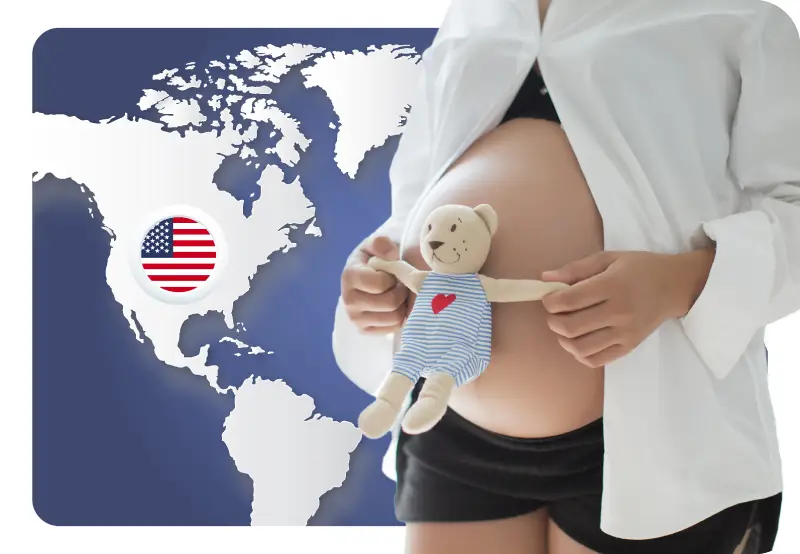
For more information visit our USA PROGRAMS section.
Surrogacy in Canada
CANADA is a country with an altruistic law, where the surrogate mother cannot receive any compensation.
Offering any compensation is punishable by up to 10 years imprisonment and a fine of 500,000 Canadian dollars.
The surrogate cannot advertise, nor can the commissioning parents advertise for them. There are waiting lists of up to 5 years to find a surrogate who will gestate a baby for strangers free of charge.
The surrogate wants to have a relationship with the parents, so a good fluency in English is essential, or we will simply be discarded as candidates.
Agencies are forbidden to act as intermediaries (also doctors and lawyers) under penalty of 3 years imprisonment, so no agency has its own infrastructure in that country.
It is an ideal country for surrogacy if you are Canadian and have a cousin, sister or friend willing to do the process for free.
Consult your family counsellor for your particular case, and we will be happy to advise you free of charge. Gestlife has its own offices and staff in this country.
Offering any compensation is punishable by up to 10 years imprisonment and a fine of 500,000 Canadian dollars.
The surrogate cannot advertise, nor can the commissioning parents advertise for them. There are waiting lists of up to 5 years to find a surrogate who will gestate a baby for strangers free of charge.
The surrogate wants to have a relationship with the parents, so a good fluency in English is essential, or we will simply be discarded as candidates.
Agencies are forbidden to act as intermediaries (also doctors and lawyers) under penalty of 3 years imprisonment, so no agency has its own infrastructure in that country.
It is an ideal country for surrogacy if you are Canadian and have a cousin, sister or friend willing to do the process for free.
Consult your family counsellor for your particular case, and we will be happy to advise you free of charge. Gestlife has its own offices and staff in this country.
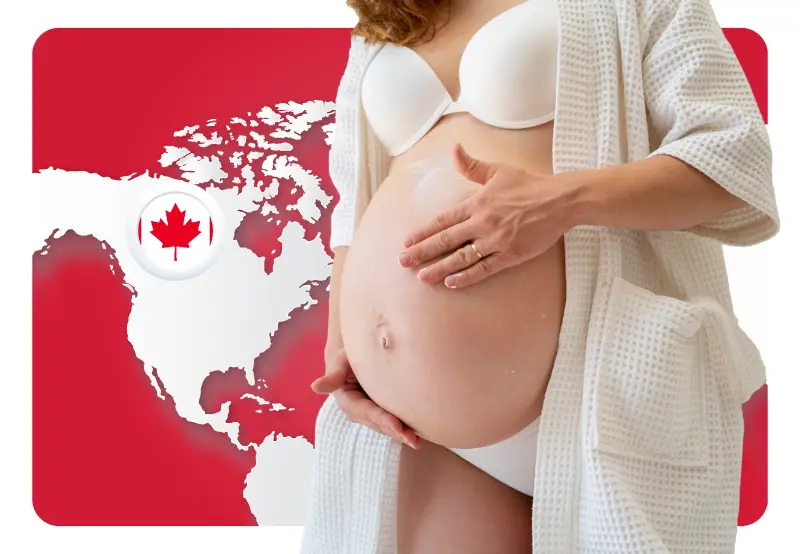
For more information visit our PROGRAMS IN CANADA section.
Surrogacy in Albania
The Law 8876, dated 4.4.2002 on Reproductive Health, in its article 43 recognizes surrogacy as an assisted reproductive technique allowed in Albania, although it has not yet developed a specific regulation. Albania has become a natural surrogate for Russia, following the ban on surrogacy for foreigners in that country since May 2022.
It is a country that respects the sexual condition of each person, as it is a tolerant country where 5 religions coexist peacefully. Albania is a member of NATO and applied for EU membership in 2014.
Due to its proximity to EU countries, the absence of visa requirements for travel, the excellence of the clinics, and the modernity of the country, it has become a preferred destination for gay couples.
Consult your family advisor for your particular case, and we will be happy to advise you free of charge. Gestlife has its own offices and staff in this country.
It is a country that respects the sexual condition of each person, as it is a tolerant country where 5 religions coexist peacefully. Albania is a member of NATO and applied for EU membership in 2014.
Due to its proximity to EU countries, the absence of visa requirements for travel, the excellence of the clinics, and the modernity of the country, it has become a preferred destination for gay couples.
Consult your family advisor for your particular case, and we will be happy to advise you free of charge. Gestlife has its own offices and staff in this country.
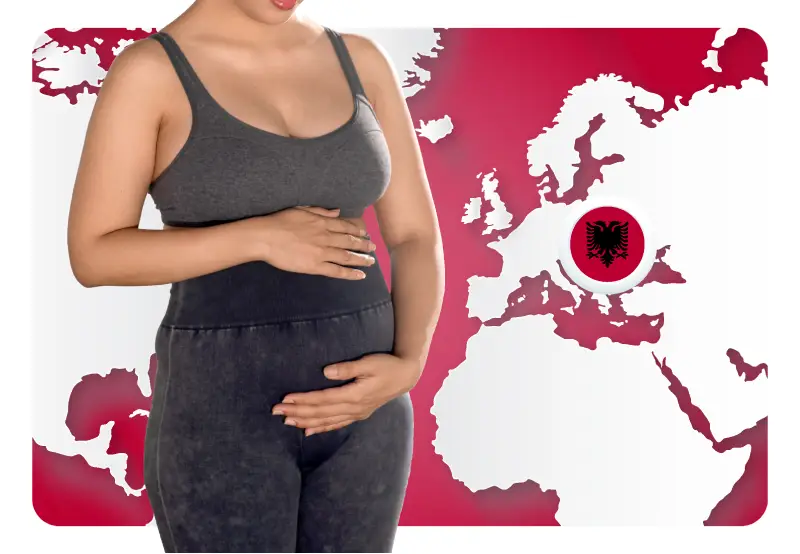
For more information visit our section of PROGRAMS IN ALBANIA.
Surrogacy in Mexico
There is no explicit surrogacy law in Mexico. Some states, such as SINALOA, QUERÉTARO, COHAHUILA and SAN LUIS POTOSI, explicitly prohibit surrogacy. TABASCO and SINALOA. limit the right to carry out surrogacy procedures to Mexican citizens only. The rest of the Mexican states have no legislation in this regard, neither for, nor against.
In MEXICO CITY there is no surrogacy law per say, but there is a proposed law focused on securing the affiliation rights of intended parents and extensive jurisprudence granting rights to intended parents.
For several years and until 16 January 2016, Tabasco was the state per excellence where most surrogacy processes took place, given that its legislation allowed it for Mexican couples, and did not explicitly prohibit it for foreigners. However, due to some abuses committed by some couples, the state of Tabasco ended up banning surrogacy for foreign citizens on 16/1/2016, respecting the processes in progress (for those parents who already had a contract with a surrogate, even if she was not yet pregnant) since no law can enter into force retroactively. But this meant that Mexico was closed to foreigners from that moment onwards.
For years and until recently, this meant the end of surrogacy processes in Mexico.
But in June 2021, the SUPREME COURT OF MEXICO, in response to an appeal lodged by a clinic, ruled that the State of Tabasco had exceeded its powers, and left it open to the states to decide whether to regulate the economic conditions for the practice of surrogacy or leave it to the freedom of the private parties involved. The Court considers it "unfounded that there is an obligation on local legislatures to provide for free surrogacy contracts". Therefore, the State can oblige it to be free of charge, establish payment conditions or leave the matter to the discretion of a private agreement. The State of Tabasco has not yet modified the law.
This is why multiple clinics in Mexico are once again offering surrogacy procedures, even though no state in Mexico has explicit legislation in favor of surrogacy.
Since then several states have legislated prohibiting surrogacy for foreign citizens: SINALOA, QUERÉTARO, COHAHUILA and SAN LUIS POTOSI.
In MEXICO CITY there is no surrogacy law per say, but there is a proposed law focused on securing the affiliation rights of intended parents and extensive jurisprudence granting rights to intended parents.
For several years and until 16 January 2016, Tabasco was the state per excellence where most surrogacy processes took place, given that its legislation allowed it for Mexican couples, and did not explicitly prohibit it for foreigners. However, due to some abuses committed by some couples, the state of Tabasco ended up banning surrogacy for foreign citizens on 16/1/2016, respecting the processes in progress (for those parents who already had a contract with a surrogate, even if she was not yet pregnant) since no law can enter into force retroactively. But this meant that Mexico was closed to foreigners from that moment onwards.
For years and until recently, this meant the end of surrogacy processes in Mexico.
But in June 2021, the SUPREME COURT OF MEXICO, in response to an appeal lodged by a clinic, ruled that the State of Tabasco had exceeded its powers, and left it open to the states to decide whether to regulate the economic conditions for the practice of surrogacy or leave it to the freedom of the private parties involved. The Court considers it "unfounded that there is an obligation on local legislatures to provide for free surrogacy contracts". Therefore, the State can oblige it to be free of charge, establish payment conditions or leave the matter to the discretion of a private agreement. The State of Tabasco has not yet modified the law.
This is why multiple clinics in Mexico are once again offering surrogacy procedures, even though no state in Mexico has explicit legislation in favor of surrogacy.
Since then several states have legislated prohibiting surrogacy for foreign citizens: SINALOA, QUERÉTARO, COHAHUILA and SAN LUIS POTOSI.
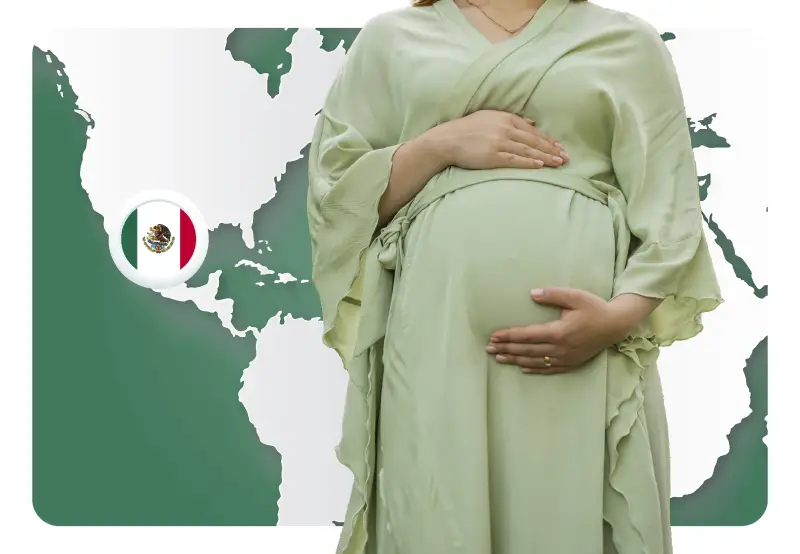
Current legal situation in Mexico
In MEXICO CITY there is no surrogacy law per say, but there is a proposed law focused on securing the affiliation rights of intended parents and extensive case law granting rights to intended parents.
The courts currently recognize the rights of intended parents. However, we must be aware that there is no State in Mexico that explicitly has a surrogacy law, so Mexico is part of the list of countries lacking legislation on the subject. It is the jurisprudence of the Courts that grants the right to the commissioning parents.
Parents wishing to choose Mexico as a destination should be aware that in the absence of explicit legislation, they are always exposed to future legislative changes, for or against, although any legislative change can never be applied retroactively.
Consult your family advisor about the programs that Gestlife offers you in Mexico, and their characteristics.
If for you, these disadvantages are too serious, you can carry out your process in another of the countries that Gestlife offers you. Consult your family advisor at Gestlife.
In MEXICO CITY there is no surrogacy law per say, but there is a proposed law focused on securing the affiliation rights of intended parents and extensive case law granting rights to intended parents.
The courts currently recognize the rights of intended parents. However, we must be aware that there is no State in Mexico that explicitly has a surrogacy law, so Mexico is part of the list of countries lacking legislation on the subject. It is the jurisprudence of the Courts that grants the right to the commissioning parents.
Parents wishing to choose Mexico as a destination should be aware that in the absence of explicit legislation, they are always exposed to future legislative changes, for or against, although any legislative change can never be applied retroactively.
Consult your family advisor about the programs that Gestlife offers you in Mexico, and their characteristics.
If for you, these disadvantages are too serious, you can carry out your process in another of the countries that Gestlife offers you. Consult your family advisor at Gestlife.
For more information, visit our PROGRAMS IN MEXICO section.
Surrogacy in Colombia
Colombia is a country where surrogacy is now practiced by clinics. There is no specific law on surrogacy, although the courts end up withdrawing custody from the surrogate as she has no genetic link with the baby.
One of the main advantages offered by this country is its prices, which are much cheaper than in the United States. The language facility for citizens of some countries (more than 700 million people speak Spanish in the world) also makes many couples choose this destination when it comes to carrying out a surrogacy process.
One of the main advantages offered by this country is its prices, which are much cheaper than in the United States. The language facility for citizens of some countries (more than 700 million people speak Spanish in the world) also makes many couples choose this destination when it comes to carrying out a surrogacy process.

Law in Colombia
There is no explicit surrogacy law in COLOMBIA. This is something you have to take into account if you finally choose this country to become a father.
The surrogacy process takes place in the capital Bogotá, although we also have programs in the city of Cartagena de Indias.
Once the baby is born, the maternity of the surrogate is challenged, given that it is accredited that the baby has a genetic link with the commissioning father, and on the contrary has no link with the gestational mother. The court definitively disassociates the surrogate from the baby, by means of a judicial sentence.
In the 2022-2023 legislature in Colombia, two bills were introduced that sought to regulate the issue. The proposed bills were P.L. 334-2023C filed by the representative to the chamber Alejandro Ocampo Giraldo and P.L. 345 of 2023C filed by the Minister of Justice and Law, Mr. Néstor Iván Osuna Patiño.
Under Colombian law, laws governing surrogacy must be processed as statutory laws, which have a special procedure within the Congress of the Republic.
One of these requirements is that they must be processed and approved within the same legislative year, which in our case was from 20 July 2022 to 16 December 2022 and from 16 March 2023 to 20 June 2023.
The bills that intended to regulate surrogacy in Colombia did not complete the process in the Congress of the Republic and therefore, they were filed and dismissed under the Colombian law of issuance of laws, as it should have been approved in a single legislature which did not happen.
To date, no other bill has been presented that seeks to regulate surrogacy in Colombia and according to interviews with the Minister of Justice and Law, it will not be presented for the time being due to the complex legislative agenda.
For the above reasons, the information that surrogacy processes will be closed in Colombia as of September 2023 is denied, and we share the links where you can verify that the two bills have been duly filed.
P.L. 334-2023C
P.L. 345-2023C
There is no explicit surrogacy law in COLOMBIA. This is something you have to take into account if you finally choose this country to become a father.
The surrogacy process takes place in the capital Bogotá, although we also have programs in the city of Cartagena de Indias.
Once the baby is born, the maternity of the surrogate is challenged, given that it is accredited that the baby has a genetic link with the commissioning father, and on the contrary has no link with the gestational mother. The court definitively disassociates the surrogate from the baby, by means of a judicial sentence.
In the 2022-2023 legislature in Colombia, two bills were introduced that sought to regulate the issue. The proposed bills were P.L. 334-2023C filed by the representative to the chamber Alejandro Ocampo Giraldo and P.L. 345 of 2023C filed by the Minister of Justice and Law, Mr. Néstor Iván Osuna Patiño.
Under Colombian law, laws governing surrogacy must be processed as statutory laws, which have a special procedure within the Congress of the Republic.
One of these requirements is that they must be processed and approved within the same legislative year, which in our case was from 20 July 2022 to 16 December 2022 and from 16 March 2023 to 20 June 2023.
The bills that intended to regulate surrogacy in Colombia did not complete the process in the Congress of the Republic and therefore, they were filed and dismissed under the Colombian law of issuance of laws, as it should have been approved in a single legislature which did not happen.
To date, no other bill has been presented that seeks to regulate surrogacy in Colombia and according to interviews with the Minister of Justice and Law, it will not be presented for the time being due to the complex legislative agenda.
For the above reasons, the information that surrogacy processes will be closed in Colombia as of September 2023 is denied, and we share the links where you can verify that the two bills have been duly filed.
P.L. 334-2023C
P.L. 345-2023C
LEGAL ADVICE
Obviously, we cannot guarantee that there will be new bills in the future, for or against surrogacy, something that can happen in all countries. However, no new law can be applied with retroactive effect, so, when there is a normative change, the ongoing processes are respected, as it happened in the other countries where there was a legislative change against surrogacy: VIETNAM, LAOS, CAMBODIA, MEXICO, RUSSIA, NEPAL, or THAILAND.
However, if the absence of legislation is a problem for you, you can do the process in the other countries where Gestlife has its own offices, and they have programs for homosexual couples.
Registration in Colombia
Once the birth has taken place, the intended parents must register the baby in the civil registry of BOGOTÁ COLOMBIA, for this purpose, a birth certificate issued by the clinic must be provided.
The maternity challenge will be initiated by the surrogate. In this way, the Colombian passport, passport of the nationality of the parents or safe-conduct (depending on the nationality of the parents) will be obtained. Consult your case with your family advisor at Gestlife.
In the case of the biological father, the surrogate appears on the birth certificate. Subsequently it will be removed when the court accepts the challenge (which always happens because the mothers have no genetic link with the child).
Obviously, we cannot guarantee that there will be new bills in the future, for or against surrogacy, something that can happen in all countries. However, no new law can be applied with retroactive effect, so, when there is a normative change, the ongoing processes are respected, as it happened in the other countries where there was a legislative change against surrogacy: VIETNAM, LAOS, CAMBODIA, MEXICO, RUSSIA, NEPAL, or THAILAND.
However, if the absence of legislation is a problem for you, you can do the process in the other countries where Gestlife has its own offices, and they have programs for homosexual couples.
Registration in Colombia
Once the birth has taken place, the intended parents must register the baby in the civil registry of BOGOTÁ COLOMBIA, for this purpose, a birth certificate issued by the clinic must be provided.
The maternity challenge will be initiated by the surrogate. In this way, the Colombian passport, passport of the nationality of the parents or safe-conduct (depending on the nationality of the parents) will be obtained. Consult your case with your family advisor at Gestlife.
In the case of the biological father, the surrogate appears on the birth certificate. Subsequently it will be removed when the court accepts the challenge (which always happens because the mothers have no genetic link with the child).
For more information visit our PROGRAMS IN COLOMBIA section.
Surrogacy in Argentina
Argentina is a destination that has recently appeared on the surrogacy world map.
Although there is no express legislation on surrogacy, the law allows the signing of a surrogacy agreement and there is a regulation since 2017 that specifies that a child born through surrogacy can be registered in the name of the commissioning or intended father only in the autonomous city of Buenos Aires.
In November 2024, two Italian parents were arrested at the border, when they tried to leave the country with their baby, for having financially compensated the surrogate mother, since in ARGENTINA surrogacy must be altruistic.
Several criminal investigations have been opened against several agencies.
This country, immersed in a major economic crisis (with an inflation rate of over 140% per year), has difficulties in making payments, or refunds, due to the restrictions on the movement of capital set by the government.
Although there is no express legislation on surrogacy, the law allows the signing of a surrogacy agreement and there is a regulation since 2017 that specifies that a child born through surrogacy can be registered in the name of the commissioning or intended father only in the autonomous city of Buenos Aires.
In November 2024, two Italian parents were arrested at the border, when they tried to leave the country with their baby, for having financially compensated the surrogate mother, since in ARGENTINA surrogacy must be altruistic.
Several criminal investigations have been opened against several agencies.
This country, immersed in a major economic crisis (with an inflation rate of over 140% per year), has difficulties in making payments, or refunds, due to the restrictions on the movement of capital set by the government.
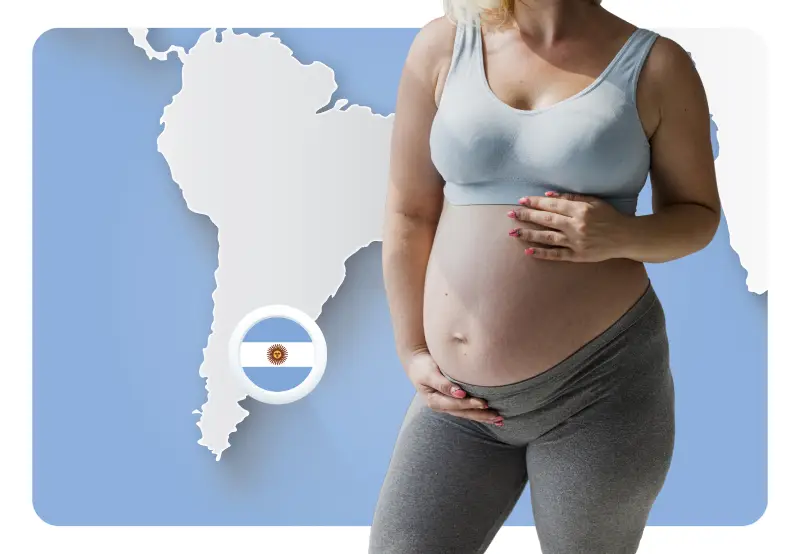
For more information visit our PROGRAMS IN ARGENTINA section.
Surrogacy in Armenia
In ARMENIA, a country with only 2.2 million inhabitants, the law allows surrogacy for heterosexual couples, but does not prohibit surrogacy for single men. However, this is a legal vacuum, as is the case in other countries mentioned above, which lends itself to the risk of a legislative change at any time. Gestlife also has an office in this country, as it develops processes for heterosexual couples.
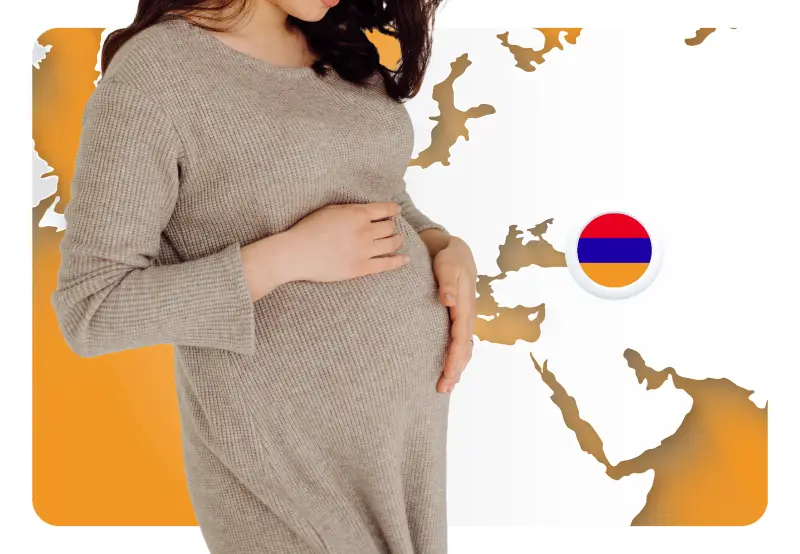
For more information visit our PROGRAMS IN ARMENIA section.
Surrogacy in Russia
You may have heard of (or met) parents who did their surrogacy with Gestlife in Russia. For 15 years this was the case, but in December 2021, the Russian Parliament banned surrogacy for foreigners, so this country has fallen off the list of countries where a gay couple can do surrogacy.
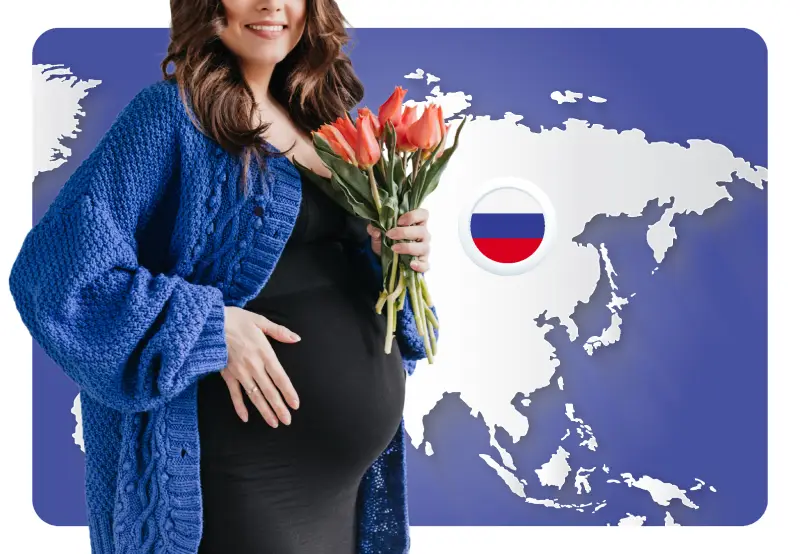
For more information visit our PROGRAMS IN RUSSIA section.
Some dangerous "inventions" in surrogacy
Just as René Magritte taught us that a drawing of a pipe is not a pipe, something similar to surrogacy is not surrogacy .
Surrogacy occurs when there is a law or jurisprudence that allows it, and legally cedes the rights of the gestational carrier to the commissioning parent(s). The rest, although it may appear to be so, is not surrogacy.
And the nuance is of vital importance, because in those countries where there is no law on surrogacy, or the jurisprudence does not contemplate it, the gestational carrier will be today, tomorrow and always the mother of the child, with rights over the child if she so desires. And you did not come to Gestlife to have legal problems in the future.
Some "agencies" have been appearing lately, offering especially to the LGTBI collective destinations that do not offer the minimum guarantees, neither legal nor medical. Countries with little or no experience in surrogacy, with no law to protect it. Countries where surrogate mothers receive ridiculous compensations (sometimes against existing laws), which do not exceed 10,000 US dollars, when an American surrogate receives 50,000 USD, or a Ukrainian mother 24,000 USD.
These are some of the "INVENTIONS" that you may come across, and which we strongly advise against. As we have told you, Gestlife has offices in all the countries where a process can be done legally. If it were possible to carry out a surrogacy process with all the guarantees in any of these destinations, we would have had offices in those countries some time ago. And if we don't have them, it is because there are no medical or legal guarantees.
Surrogacy occurs when there is a law or jurisprudence that allows it, and legally cedes the rights of the gestational carrier to the commissioning parent(s). The rest, although it may appear to be so, is not surrogacy.
And the nuance is of vital importance, because in those countries where there is no law on surrogacy, or the jurisprudence does not contemplate it, the gestational carrier will be today, tomorrow and always the mother of the child, with rights over the child if she so desires. And you did not come to Gestlife to have legal problems in the future.
Some "agencies" have been appearing lately, offering especially to the LGTBI collective destinations that do not offer the minimum guarantees, neither legal nor medical. Countries with little or no experience in surrogacy, with no law to protect it. Countries where surrogate mothers receive ridiculous compensations (sometimes against existing laws), which do not exceed 10,000 US dollars, when an American surrogate receives 50,000 USD, or a Ukrainian mother 24,000 USD.
These are some of the "INVENTIONS" that you may come across, and which we strongly advise against. As we have told you, Gestlife has offices in all the countries where a process can be done legally. If it were possible to carry out a surrogacy process with all the guarantees in any of these destinations, we would have had offices in those countries some time ago. And if we don't have them, it is because there are no medical or legal guarantees.
Suddenly, agencies are appearing that offer such destinations:
These types of programs, as we have said, were made because the end of the program often takes place in a European country, where there is no specific law on surrogacy. Some parents resort to this program if they cannot resort to another one for economic reasons, or because the process takes place at the end in a country within the Schengen area, which allows them to return to the country of origin with a certain degree of ease.
It has, however, significant drawbacks:
It is more expensive than other destinations such as Albania.
It is necessary to lie in the civil registry, passing the surrogate off as a partner, which we do not recommend, as it is a crime to lie to a public official.
The surrogate has no right to give up her baby because Czech law does not allow it. No notary will draw up a notarial deed to this effect, which is necessary in the future if we want a spouse to adopt the baby.
For parents from those countries (like Spain) that do not grant nationality and passport to the baby from the beginning, it is necessary to return by car, which means a journey of more than 2000 km or more in most cases.
It has, however, significant drawbacks:
It is more expensive than other destinations such as Albania.
It is necessary to lie in the civil registry, passing the surrogate off as a partner, which we do not recommend, as it is a crime to lie to a public official.
The surrogate has no right to give up her baby because Czech law does not allow it. No notary will draw up a notarial deed to this effect, which is necessary in the future if we want a spouse to adopt the baby.
For parents from those countries (like Spain) that do not grant nationality and passport to the baby from the beginning, it is necessary to return by car, which means a journey of more than 2000 km or more in most cases.
Surrogacy in Czech Republic
The Czech Republic has been one of the destinations where more parents have fallen into the temptation to "make their process seemingly easier", at the cost of incurring serious offences.
Most of the time, the parents resorted to the services of a fertility clinic in Kharkov (Ukraine) where the surrogate became pregnant and was then sent to the Czech Republic to have the baby, taking advantage of the fact that this country is part of the EU and is within the Schengen area, where it is not necessary to issue a passport for the baby to travel to the country of the commissioning parents. This was useful for those parents whose country of origin (as is temporarily the case in Spain) does not issue a passport for the baby. These parents had to commit two offences:
Lying in the civil registry to a public official by passing off the surrogate as his girlfriend.
Falsifying a public document before a notary, saying that the surrogate had not received any compensation, which was not true, which constitutes a crime of falsification of a public document.
Some parents were caught in this kind of trap, because the local agencies did not inform them until the last minute that they had to do this, at which point the parents, with their baby in their arms, could no longer back out....
Unfortunately, in the spring of 2022, the police dismantled this operation, through the so-called "OPERATION SPANIEL". Four doctors from the clinic were arrested, and parents and surrogate were interrogated separately in search of confirmation of payment to the surrogate, and the registration of the baby was refused.
For more information about OPERATION SPANIEL you can read the following article (using google translator). https://www.seznamzpravy.cz/clanek/domaci-kauzy-operace-spanel-v-praze-se-prodavaji-deti-vyrobene-na-zakazku-203870
Therefore, the Czech Republic is not a recommended destination for surrogacy.
Most of the time, the parents resorted to the services of a fertility clinic in Kharkov (Ukraine) where the surrogate became pregnant and was then sent to the Czech Republic to have the baby, taking advantage of the fact that this country is part of the EU and is within the Schengen area, where it is not necessary to issue a passport for the baby to travel to the country of the commissioning parents. This was useful for those parents whose country of origin (as is temporarily the case in Spain) does not issue a passport for the baby. These parents had to commit two offences:
Lying in the civil registry to a public official by passing off the surrogate as his girlfriend.
Falsifying a public document before a notary, saying that the surrogate had not received any compensation, which was not true, which constitutes a crime of falsification of a public document.
Some parents were caught in this kind of trap, because the local agencies did not inform them until the last minute that they had to do this, at which point the parents, with their baby in their arms, could no longer back out....
Unfortunately, in the spring of 2022, the police dismantled this operation, through the so-called "OPERATION SPANIEL". Four doctors from the clinic were arrested, and parents and surrogate were interrogated separately in search of confirmation of payment to the surrogate, and the registration of the baby was refused.
For more information about OPERATION SPANIEL you can read the following article (using google translator). https://www.seznamzpravy.cz/clanek/domaci-kauzy-operace-spanel-v-praze-se-prodavaji-deti-vyrobene-na-zakazku-203870
Therefore, the Czech Republic is not a recommended destination for surrogacy.
For more information please visit our PROGRAMS IN CZECH REPUBLIC section.
Cyprus
For more information, please visit our PROGRAMS IN CYPRUS section.
Belgium
Belgium prohibits commercial surrogacy, and the law determines that any agreement made between the parties, even in altruistic surrogacy, is null and void, and prevents the registration of the baby in the name of the commissioning parents. It is a country with a contradictory law, as there are two or three clinics that offer surrogacy to Belgian parents (hetero couples) but then the law does not cover this act. It is therefore not a recommended country for surrogacy.
The Netherlands
The Netherlands prohibits commercial surrogacy, i.e. the surrogate receives no compensation, and Luxembourg does not allow surrogacy, making it criminally equivalent to organ trafficking.
Austria
In Austria surrogacy is forbidden by law. It is therefore not a recommended country for surrogacy.
Poland
Surrogacy is forbidden in Poland.












